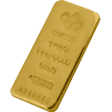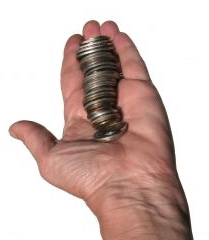What Good is a Bar of Gold When the Shelves are Empty?
Question:
Thanks for the course, I am 5 modules completed. [Our free ecourse begins here – Ed.]
Q – can you tell me or point me to resources that will help me answer this objection to metal investment:
What good is a bar of gold when the shelves are empty?
My assumed answer is that when the shelves are stocked again, and everyone’s savings have disappeared into air, I will have something to trade.
What do you say? Or where can I look for answers?
Many thanks, C
Our Response:
You’re on the right track by our way of thinking anyway.
Many people have the answer when discussing the need for gold, well you can’t eat gold so you might as well just have food and guns, whisky and cigarettes to trade.
Of course you can’t eat paper money either though, but we don’t all barter goods and services with each other currently. We use a government mandated “medium of exchange” for convenience.
But if there was a collapse of the current government enforced monetary system and if you had more than a few thousand paper dollars you wanted to protect, you’d need a lot of space to turn these savings into the likes of food, alcohol and cigarettes. Plus you’ll also run into the problem of stopping them from perishing over time. So hence why gold and silver have been money for millennia.
Doug Casey refers to Aristotle’s reasons why gold is money…
“A good form of money must be: durable, divisible, consistent, convenient, and have value in and of itself.”
See more here.
And Richard Russell of the Dow Theory newsletter expands upon these in regards to money saying:
(1) It must be durable, which is why we don’t use wheat or corn or rice.
(2) It must be divisible, which is why we don’t use art work.
(3) It must be convenient [portable], which is why we don’t use lead or copper.
(4) It must be consistent, which is why we don’t use real estate [or diamonds]
(5) It must possess value in itself, which is why we don’t use paper.
(6) It must be limited in the quantity that is available, which is why we don’t use aluminum or iron.
(7) It should have a long history of acceptance, which is why we don’t use molybdenum or rhodium.
So back specifically to your question.
If the shelves are bare as you say, it may be that they don’t fill up again at all. If you read anything about the German Weimar hyperinflation or more recently Zimbabwe you’ll see a side effect of high inflation was that there was actually very little on the shelves. People simply got rid of their cash as quickly as they could because it was losing so much value – hence the empty shelves. We’ve read how German farmers during the Weimar Republic eventually refused to accept German Marks as payment for their food, but accepted gold for their produce back then.
So having a long term store of value would let you exchange this “store of value” for the goods and services you needed.
And history says gold and silver will likely be valued most as a means of exchange.
Our thinking is that if you want some financial insurance for the end of the current monetary system and paradigm – or even just for the altering of it rather than the end of it – then physical gold and silver under your control are the only financial assets that are not someone else’s liability – i.e. they have no counterparty risk.
Even if we don’t get an apocalyptic scenario, paper currency will likely continue to be devalued due to the massive global debt load.
Despite what those in charge would have us believe this isn’t shrinking and the only way to be rid of it is by default (unlikely) or by debasing it away.
Our guess is the purchasing power of gold and silver will conversely continue to increase in the coming years – albeit probably not in a straight line.
So it may be that you eventually swap precious metals for another beaten down asset of some type like property, shares etc as at the end of the 1970’s precious metals bull market – and get more for your money then. For example at the end of 1970’s bull market was silver at US$50 and the average house price in USA was US$49,000, so 1000 oz silver could have bought you a house. See these articles for some NZ historical comparisons.
Could NZ House Values Drop by 80 Percent? (An initial look at NZ Housing to Gold Ratio)
NZ Housing to Gold Ratio Update
But gold (and silver) also acts as insurance in case of a complete breakdown of the monetary system.
Either way, you should be able to swap gold for something else you want/need more, just as you have been able to for a couple thousand years.
Now that I’ve written all that I just remembered we had a somewhat similar question a while back that we turned into an article in answer to it so that might be worth your while to have a look at that too:
Why Gold is More Valuable Than Worthless Paper
So in short – yes you would likely be able to swap gold for the goods you need. Although in the case of a monetary collapse, history shows that it might not actually be with a shopkeeper but rather could be with the end producer of the good instead.
P.S. We just posted this video by Chris Duane which coincidentally also looks at this question. Skip forward to the 10:20 min mark to hear his take on silver in a collapse. He makes the point that you should have all other vital supplies – food, water etc – before you even start thinking of buying silver which makes perfect sense. As the Christchurch earthquakes prove it pays to be ready with emergency food, water, clothing and shelter for natural disasters as well as government made ones.
Related Articles
Buying a Home Safe for Gold Silver Storage
There are many gold silver storage options available. From private vaulting and storage companies to “midnight gardening”. We go through the main ones in module 7 of our free Gold Ecourse: Module 7 of 8 – How and where to store it A home safe is one ...How to Sell Gold and Silver Bullion
How do I sell gold and silver bullion? That is a question we’ve been receiving a bit lately. Here is a summary of one question from this week: Q1: What are the best ways to know when to sell? i.e what’s the best exit stragey for a “mum and dad” ...Can You Get Insurance on Gold and Silver Bullion in New Zealand?
If you’ve bought or are thinking about buying gold and silver bullion, the question you should ask is where will you store it? The next question that often springs to mind is can I insure gold and silver bullion in New Zealand? The short answer to ...How soon after payment will I receive my bullion?
Once you have made payment and your funds cleared, delivery of your gold or silver bullion is generally about 4-6 days later. Orders are not sent on a Friday to ensure the goods aren’t sitting around a courier depot over the weekend. However ...Why is the silver margin on bars so much more than the mark-up on gold bars?
See this article as we cover this topic here: http://goldsurvivalguide.co.nz/why-is-it-so-expensive-to-buy-silver-in-new-zealand/


